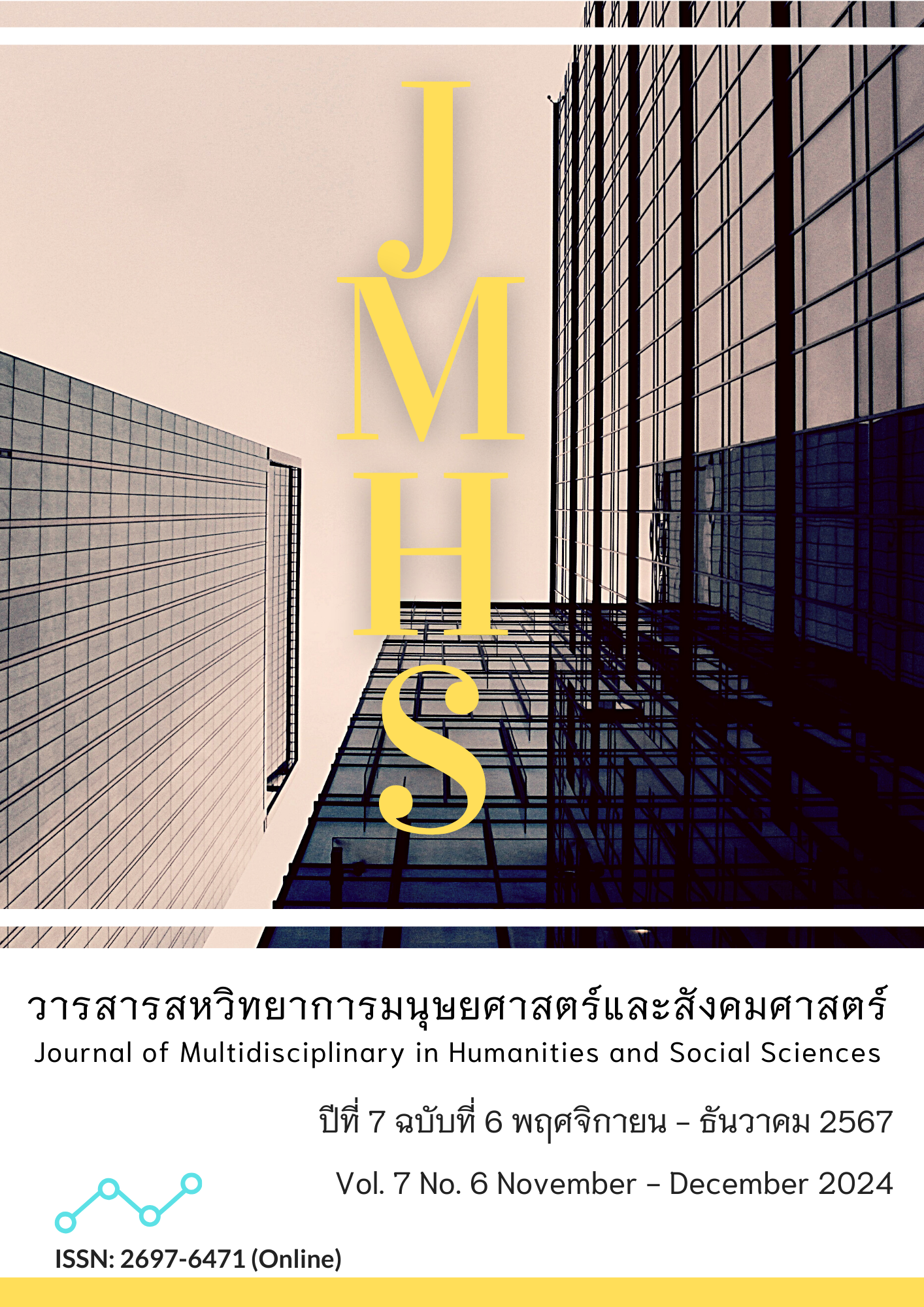Development of Energy Literacy Using Socio-Scientific Issues Based-Learning Combined with Boardgames on Energy Resources for 8th Grade Students
Main Article Content
Abstract
The purposes of this article were to 1) study the guidelines of learning management using the socio-scientific issues (SSI) approach with boardgames to enhance energy literacy about energy resources and 2) study the result of developing energy literacy from learning management using the socio-scientific issues (SSI) approach with boardgames to enhance energy literacy about energy resources for 8th-grade students. The research methodology was classroom action research. The participants were 14 8th-grade students enrolled during the second semester of the academic year 2023 from an expanded school in Uttaradit. The research instruments used in this study were (1) 3 lesson plans using the socio-scientific issue approach with 3 boardgames, (2) the learning management reflections, (3) the activity learning sheets, and (4) the assessment form about energy literacy. The collected data were analyzed using content analysis and percentage.
The results of this research revealed that the guideline of learning management using the socio-scientific issue (SSI) approach with boardgames was as follows: 1) situation issues, The choosing of energy situation issues should be affected by society and the environment; 2) using the character cards could stimulate students’ interest in collecting information. by inquiry process through grouping; 3) reasoning about SSI, students had a discussion about their role after playing board games that affected the events and consequences in that simulation scenarios; and 4) synthesizing of concepts and practices, teachers should create the conceptions with students about decision-making issues and provide justifications for decisions on social issues. In addition, the students’ energy literacy, knowledge, and attitude had progressed in every operation cycle after learning through the SSI approach with boardgames. The level of energy literacy and behavior was also higher than before learning through the SSI approach with boardgames. In conclusion, the learning management of the socio-scientific issue (SSI) approach with boardgames has been shown to enhance students' energy literacy. The findings from this research will provide guidelines for learning management of the socio-scientific issue approach with boardgames to enhance energy literacy for secondary school students.
Article Details

This work is licensed under a Creative Commons Attribution-NonCommercial-NoDerivatives 4.0 International License.
Views and opinions appearing in the Journal it is the responsibility of the author of the article, and does not constitute the view and responsibility of the editorial team.
References
ชนิดา เสียงดัง และ สุทธิกัญจน์ ทิพยเกษร. (2564). ผลของการจัดการเรียนรู้แบบเสาะหาความรู้เป็นกลุ่มต่อทักษะการทำงานร่วมกันและผลสัมฤทธิ์ทางการเรียนของนักเรียนมัธยมศึกษา ปีที่ 1. วารสารปัญญา, 28(3), 15-29. สืบค้นจาก https://so06.tci-thaijo.org/index.php/panya-thjo/article/view/251200
ชนินท์ ว่องกุศลกิจ. (2562). ถอดบทเรียนโครงการออกแบบเกม ออกแบบสังคม. กรุงเทพฯ: เอส.อาร์. พริ้นติ้ง แมสโปรดักส์.
ธีระวุฒิ ศรีมังคละ (2564). ความสำคัญของบอร์ดเกมต่อการจัดกิจกรรมการเรียนรู้. สืบค้นเมื่อ 9 มกราคม 2567, จาก https://www.gotoknow.org/posts/696293#google_vignette
บุศมาพร กันทะวัง, สุรีย์พร สว่างเมฆ และ ปราณี นางงาม. (2562). แนวทางการจัดการเรียนรู้ตามแนวคิดประเด็นทางวิทยาศาสตร์และสังคมเพื่อส่งเสริมการรู้พันธุศาสตร์ เรื่อง เทคโนโลยีทางดีเอ็นเอ สำหรับนักเรียนชั้นมัธยมศึกษาปีที่ 4. วารสารศึกษาศาสตร์ มหาวิทยาลัยนเรศวร, 23(1), 192-203. สืบค้นจาก https://so06.tci-thaijo.org/index.php/edujournal_nu/article/view/183123
พงศ์กรณ์ พันธุ์โยศรี และ อลิศรา ชูชาติ (2559). ผลของการเรียนรู้ตามแนวคิดประเด็นทางวิทยาศาสตร์และสังคมที่มีผลต่อความสามารถในการรู้สิ่งแวดล้อมของนักเรียนมัธยมศึกษาตอนต้น. วารสารอิเล็กทรอนิกส์ทางการศึกษา, 11(2), 336-350. สืบค้นจาก
https://so01.tci-thaijo.org/index.php/OJED/article/view/84156
พจงจิตร นาบุญมี และคณะ. (2562). การจัดการเรียนรู้โดยใช้ปัญหาเป็นฐานเพื่อพัฒนาสมรรถนะการแก้ปัญหาแบบร่วมมือ เรื่อง การเคลื่อนที่แบบหมุนของนักเรียนชั้นมัธยมศึกษาปีที่ 4. วารสารศึกษาศาสตร์ มหาวิทยาลัยมหาสารคาม, 13(2), 193-205.
รัชนีวรรณ ตั้งภักดี. (2565). การพัฒนารูปแบบการสร้างบอร์ดเกมเพื่อการศึกษาในประเทศไทย. วารสารศึกษาศาสตร์ มสธ, 15(2), 117-132. สืบค้นจาก https://so05.tci-thaijo.org/index.php/edjour_stou/article/view/257826
วราภรณ์ ลิ้มเปรมวัฒนา และ กันตภณ ธรรมวัฒนา. (2560). พฤติกรรมในการเล่นเกมกระดานและองค์ประกอบ ของปัจจัยทางด้านผลกระทบจากการเล่นเกมของวัยรุ่น ในเขตกรุงเทพมหานคร. วารสารวิจัยสังคม, 40(2), 107-132. สืบค้นจาก https://so04.tci-thaijo.org/index.php/socialresearchjournal/article/view/90922
ศศิเทพ ปีติพรเทพิน. (2558). การจัดการเรียนรู้วิทยาศาสตร์กับสังคมแห่งศตวรรษที่ 21. สมุทรปราการ: บอสส์การพิมพ์.
ศิริพร ศรีจันทะ. (2562). การสร้างและใช้เกม เพื่อการเรียนรู้แบบ Active Learning สู่ชั้นเรียน: สร้างห้องเรียนยุคใหม่ให้เปี่ยมไปด้วยความสุข. EDUCA. สืบค้นเมื่อ 9 มกราคม 2567, จาก https://www.educathai.com/events/2019/44
สฤนี อาชวานันทกุล. (2559). BOARD | GAME | UNIVERSE จักรวาลกระดานเดียว. กรุงเทพฯ: แซลมอน.
สิรินภา กิจเกื้อกูล. (2557). การจัดการเรียนรู้วิทยาศาสตร์ทิศทางสำหรับครูศตวรรษที่ 21. เพชรบูรณ์: จุลดิสการพิมพ์.
เสถียรพงษ์ ดวงรัตนเอกชัย. (2562). Game-based learning ทางเลือกสำหรับการศึกษาวิทยาศาสตร์ยุคใหม่. นิตยสาร สสวท., 47(216), 25-30. สืบค้นจาก https://emagazine.ipst.ac.th/216/#26
Akitsu, Y., & Ishihara, K. N. (2019). Energy literacy assessment: a comparative study of lower secondary school students in Thailand and Japan. International Journal of Educational Methodology, 5(2), 183-201. https://doi.org/10.12973/ijem.5.2.183
Cotton, D. R. E., Miller, W., Winter, J., Bailey, I. & Sterling, S. (2015). Developing students’ energy literacy in higher education. International Journal of Sustainability in Higher Education, 16(4), 456-473. DOI:10.1108/IJSHE-12-2013-0166
DeWaters, J., & Powers, S. (2013). Establishing measurement criteria for an energy literacy questionnaire. The Journal of Environmental Education, 44(1), 38–55. DOI:10.1080/00958964.2012.711378
Lipman, M. (2003). Thinking in education. Cambridge: Cambridge University.
Sadler, T. D. (2017). Evolution of a model for socio-scientific issue teaching and learning. International Journal of Education in Mathematics, Science and Technology, 5(1), 75-87. DOI:10.18404/ijemst.55999
Tsai, J. C., Chen, S. Y., Chang, C. Y., & Liu, S. Y. (2020). Element enterprise tycoon: Playing board games to learn chemistry in daily life. Education Sciences. 10(3), 48-58. DOI:10.3390/educsci10030048
U.S. Department of Energy. (2017). Energy literacy. Retrieved September 2, 2023, from https://www.energy.gov/energysaver/energy-literacy-essential-principles-energy-education


